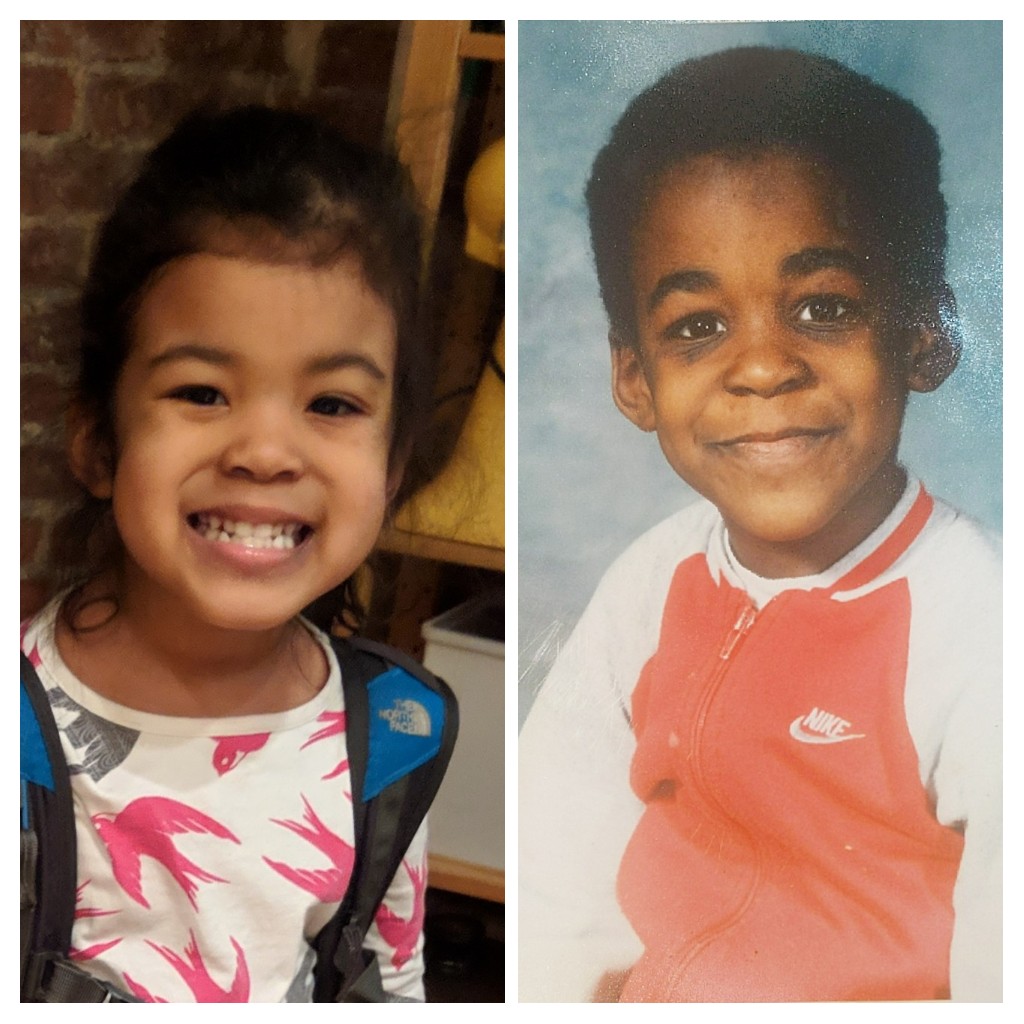Insight struck twice in our living room a couple weeks ago as my daughter was teaching herself the Peppa Pig theme song, with some help from us. We played it for her, and put some stickers on the keys to help her, but it took a long time for her to actually start playing it in sequence. When she was actually learning this she would sort of work away quietly, until she hit a point where she needed a break. Then she would get really silly, blow raspberries or joking around. After about 4 or 5 rounds of tunnel-vision followed by silliness, she eventually had the song mastered. I was left thinking about what her learning style might mean for her future schooling, as it seems to be quite similar to mine.
Julianne’s focus was as intense as her silliness and she shifted back and forth between the two so quickly, it seemed like they were both part of her problem solving process. This could be a headache for her future teachers. As an elementary schooler, she might be the student who tells jokes, distracts their friends, and gets notes home about behavior, but can answer the questions and tear through the worksheets. It’ll be hard to find success in a skill and drill class. Ideally she would be in a class focused on solving rich problems, explaining big ideas, and collaboration may keep her too busy to get in silly mode, or channel that energy towards something productive. Any teacher who can embrace her learning process and not make Julianne feel like an outcast would be good. Most teachers don’t tolerate a lot of silliness, preferring to punish the student or push them out of class until they get in line. Hopefully, Julianne’s future teacher will focus on creating a teaching environment that funnels Julianne’s focus and silliness, along with the energy that the other students bring, through activities that give students room to explore their curiosity.
There are three big things that give me a lot of hope that Julianne will find the right teacher. One is the internet’s growing collection of math activities, instructional routines, and curricula that speak to a variety of learners. Everyday more lesson ideas are posted on the #MTBoS and around the web for teachers to find. Another source of hope is the increased agency that teachers are given from their administrators, curriculum writers, and school districts. In NYC, teachers are expected to have rich discussions, facilitate group work, and customize or supplement lessons using their discretion. All of this would be unthinkable when I was in school. Lastly, because teachers have materials, and agency, they can make decisions that affirm the identities of their students, prevent the marginalization of students, and seek to disrupt systems of oppression and microaggressions at play in their school. Based on ideas happening on Twitter, with curriculum, and in my district, it seems like the focus on how identity affects the classroom will be at the forefront, going forward. This makes me very optimistic for what my daughter’s teacher will be able to accomplish.
My daughter, a biracial girl, will be treated differently in Brooklyn than me, the only black student in my suburban Detroit 5th grade. We learn similarly, so it may be useful to compare one of my school experiences where a teacher writhed my identity. Of course, the teachers of my classes, and her classes would have to make different choices because of the different culture of the school and our different identities.
I HATED social studies from the beginning of 5th grade. Mr Brownbear, along with my other teachers, sent me to the office so often I thought it was my assigned seat. One day, we took turns drawing little slips of paper from an envelope, each with names for our colonial explorers research project. My turn came, and the teacher pulled me aside with the same tone that I hear before I’d get a pink slip. I wasn’t in trouble He didn’t let me draw from the same envelope as everyone else, instead giving me a handwritten slip he’d been saving for me. It read “Jean Baptiste Point du Sable.” I learned he was the founder of Chicago, and also a Black man.
Mr Brown Bear validated my identity and it made an unforgettable impact on me and probably on his teaching as well. Mr Brownbear must have made some changes too. He must have looked critically at the materials he was going to teach, and used his agency to change the task to reach the dual goals of satisfying the content and validating my identity. I’d had issues around being the only Black student in my grade which were probably well known among the teachers, so it was pretty clear that he was using his discretion as an attempt to expand the discussion around a unit that would otherwise be dominated by Whiteness. The fact that I’m still talking about shows that teachers who can make these kinds of choices can be impactful. I just wish I could do more than hope that my daughter’s teacher will exercise their discretion in similar ways.

Looking to validate kids identities, racial and ethnic backgrounds, gender, languages, should be a natural part of planning for teachers today. With a preponderance of activities, technology, and more ways than ever to collaborate, this work will soon become a necessity for teachers. The right choice could also alter the focus/silliness ratio for kids like me for weeks, even years. My experience with Mr Brownbear was in a social studies, and I can’t recall any similarly affirming experiences from math. Math was very abstract, rarely relevant, and often with timed tests that made me really hate the subject. My math teacher wouldn’t have the palette of options for affirming kids identities, making math culturally relevant, and eliminating the negative effects of status that will be available to my daughter’s teacher.
Julianne’s teacher will have a lot more agency, and a lot more materials, so her education will be great and she will love math…right? Despite all that’s possible, this future teacher’s discretion will determine what my daughter’s math class feels like. Maybe they will discern that Julianne’s silliness is disrupting the others and kick her out of class. Maybe the teacher will find a way to modify a lesson that affirms my daughter’s identity. The teacher’s discretion will have a great impact in a student feeling confident among their peers, and feeling confident as a mathematician. What’s scary is that it’s hard to know how it will affect the class. What’s even scarier is that the teacher may not know either. The use of discretion will be influenced by the implicit biases that the teacher may not even be aware that they hold. Deborah Ball, whose 2018 AERA talk influenced a lot of my thinking. In the talk she dissects a short clip of her teaching to illustrate the way she used her discretion to support the class seeing black girl brilliance. It is a great clip that everyone should find the time to watch. The increased attention that all of this is getting from the research community and on twitter makes me hopeful. I’m hopeful that maybe the people in the research community and on twitter can start to create a conversation about students’ identities and how they can be validated as they are learning math. Especially if they are kids who can be a little silly.


Leave a Reply